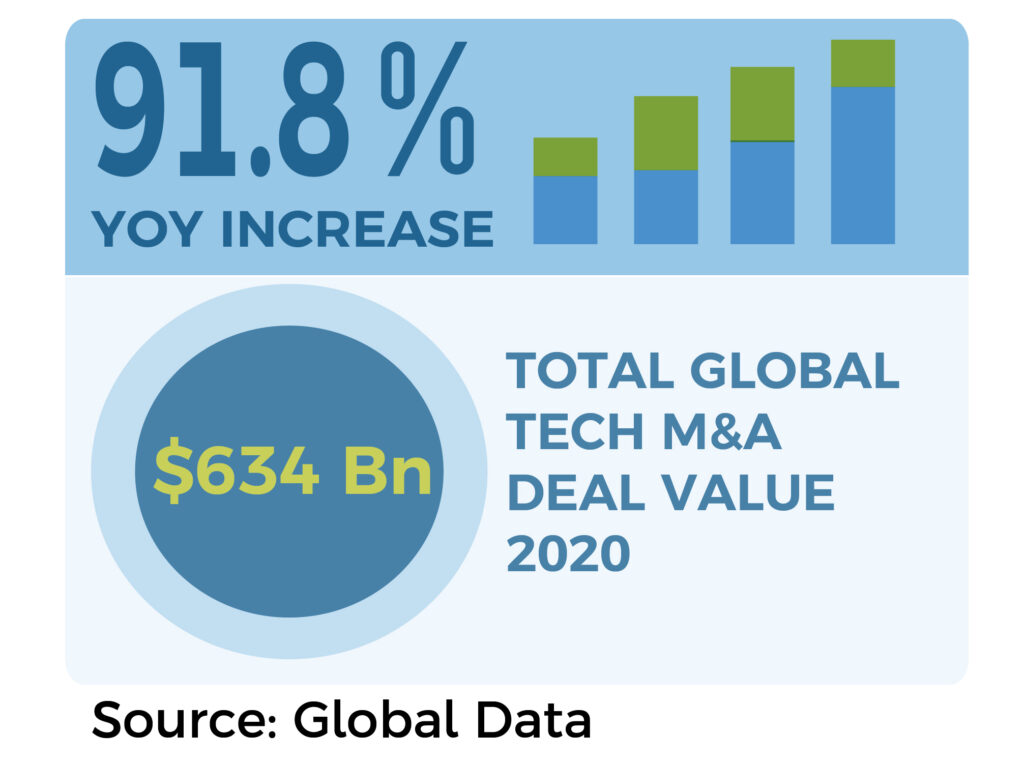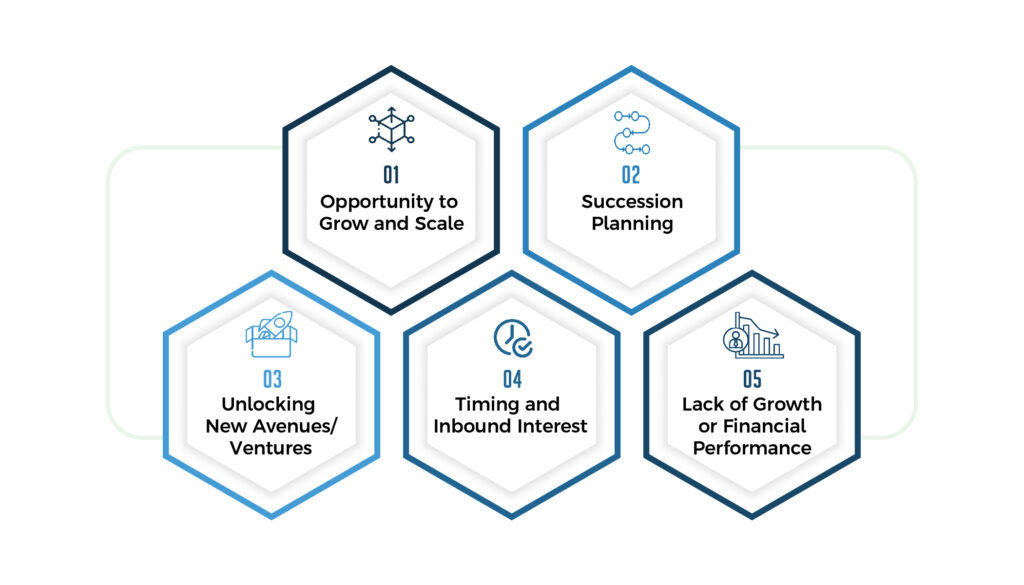Despite the unpredictability brought in by the pandemic, the flurry of technology deals has remained fairly constant, with global tech M&A deals last year totaling $634 billion, a 91.8% year-over-year increase, according to GlobalData.

With such favorable market conditions, it is an attractive time to sell a technology firm. However, to complete a successful M&A transaction with favorable valuation and financial terms, requires proactive preparation and an experienced advisory team leading this process with you to ensure it meets all your objectives. Especially, in light of the current challenges, it is critical for any organization considering a full sale or partnership with private equity to be well prepared, and understand what such investors expect. While starting, growing and making a business succeed can be tough; successfully exiting the business can sometimes be tougher. In our experience with mid-market Tech M&A transactions at SA, one of the most common regrets we often hear from entrepreneurs who have exited is that they realized the value that was lower than their expectations from the deal, or they feel that the business was running much better when it was under their control. At SA, we believe that several avenues must be considered before arriving at any decision to sell, and after careful consideration, once you arrive at such a decision, it is important to ensure the core financial and strategic objectives founders have for their own journey as well as towards realizing the full potential of the company they’ve built, people who have contributed along the way, and so on are holistically considered within the context of the deal.
In an ideal world, one would want their technology business to become highly popular and successful, with an ability to attract global private equity or strategic investors at favorable valuations. However, there is a wide range of considerations before an entrepreneur decides to sell their business. While there is no one size fits all, sometimes through a strategic sale, entrepreneurs aim to create something much bigger than what could have been created in a standalone journey by bringing on board a strategic buyer who can add value to the business and help them grow the business multi-fold and create a unique platform for their next venture. Typically, an entrepreneur should sell their business to monetise its value, reduce risk or enable other drivers for creating liquidity at a certain stage in their journey. In our experience of helping technology clients for over more than a decade in their exit strategies and through conversations with investors, we have narrowed down the following as some of the key reasons that entrepreneurs may see for selling either majority or minority interest in their business:

1) Opportunity to grow and scale: While many companies grow, very few successfully scale and drive sustained profitability. Often, selling to a strategic buyer is one of the best ways to accomplish this. The business you have built may represent a very unique, complementary strategic fit with another larger company, whereby, it may be possible to scale the company multiple times over, through the large customer base, synergies and revenue that can be exploited together. Including the right strategic buyers not only increases the likelihood of a successful transaction at a premium valuation but also increases competition and drives up value across the buyer universe.
2) Succession planning: The operational demands of running a family business or other closely held enterprise can be all-consuming, but it’s vital that business leaders take the time needed to assess their organization’s business succession planning. When there isn’t an obvious successor to take over, business owners may look to the community: Is there another entrepreneur, or even a competitor, that would purchase your business?
3) Unlocking New Avenues/Next venture: With every passing day, technology is taking a step deeper into our lives. Sometimes when entrepreneurs come across a better opportunity, they sell their existing business, devote their time to the new business opportunity that came along, and just try to make that the best it can be. If the opportunity of something more financially rewarding comes along, then it may be the case that you decide to focus all your attention on this new venture. If you are therefore unable to dedicate your energies to your current business, you may look to sell it on to someone who can give it the time and effort required.
4) Timing and inbound interest: With premium valuations at the top end of the ranges seen over the past decade, the current situation is very favourable for sellers of technology businesses. Only 2 other periods in the past 25 years- 1999 and 2007- have represented similar valuation ranges where a large majority of investor payback periods on investments or M&A exceed 12 years. There is overwhelming trend data that suggests the risk-reward changed significantly in the subsequent 2-4 years following these time periods with a cool-off phase after a near decade-long technology boom cycle. As we see an extraordinary amount of pick-up in deal-flow in the first half of 2021, this is increasingly an important factor in M&A transactions from our experience.
Oftentimes, investors who see value in your business may present an offer, when you least expect it. In today’s environment, most initial offers are generally lower than the company’s fair market value (FMV) and often something the shareholders should not accept. At this stage, it makes sense for you to engage a professional M&A advisory firm to help you not only determine if the offer is competitive based on objectively assessing fair market value (FMV) of your company, but also evaluate and improve the valuation and terms of the offer, should you decide to pursue the inbound interest.
5) Lack of growth or financial performance: It is only natural that at a certain stage after several years of successfully growing the company, an Entrepreneur may explore strategic options if growth has reached a peak or if the profitability of the business has been impacted, or other financial parameters are no longer meeting shareholder expectations. If your Technology company is experiencing this situation, there has never been a more favorable time for raising external investment or shaping a lucrative exit. As we see a further intensification of competition, the levels of investment required to stay ahead and grow are becoming unsustainable for many companies without external capital, which is another reason driver for one to see if a like-minded strategic investor can help you step up investment and growth, especially in sectors where your competition is well capitalized with external investment. That said, even when business owners begin to see the competition keep them behind, they can either actively invest more capital and resources in the company to keep up or choose to sell their business. This can be a monumental decision for the business owner and it is important to evaluate every possible avenue before deciding to sell. To make sure the company gets its fair share of price after selling, this is a very critical decision for the company to make.
At SA, we understand that building a company is an arduous, long and highly emotional journey for most entrepreneurs. Entrepreneurs put their blood, sweat, and tears into building a successful business. As a result, any strategic investment or exit needs to be handled with extreme care as this is not just a financial decision, the strategic and emotional considerations for founders cannot be overlooked in any transaction. The advisory team at SA is committed to partnering with entrepreneur-led tech companies to realise the best strategic outcomes that exceed your objectives in every M&A situation – whether we are mandated to drive a strategic investment or shape an exit strategy over time.
To share feedback on this blog or explore how SA could assist with an M&A situation you are considering, please write to us at [email protected]
Newsletter Subscription
SubscribeREAD NEXT
- Smart, Connected, and Autonomous: The Role of Digital Engineering in Next-Gen Vehicle
- Opportunities in Generative AI: Fueling Innovation and Strategic Growth
- Digital Engineering: Powering Innovation & Growth Across Mission-Critical Industries
- Weaving the Future: How Data Fabric Powers Enterprise Transformation
- The Modernization Trinity: Unlocking Growth with Cloud, App and Data Modernization
Subscribe
Stay current with our latest insights in your inbox.


